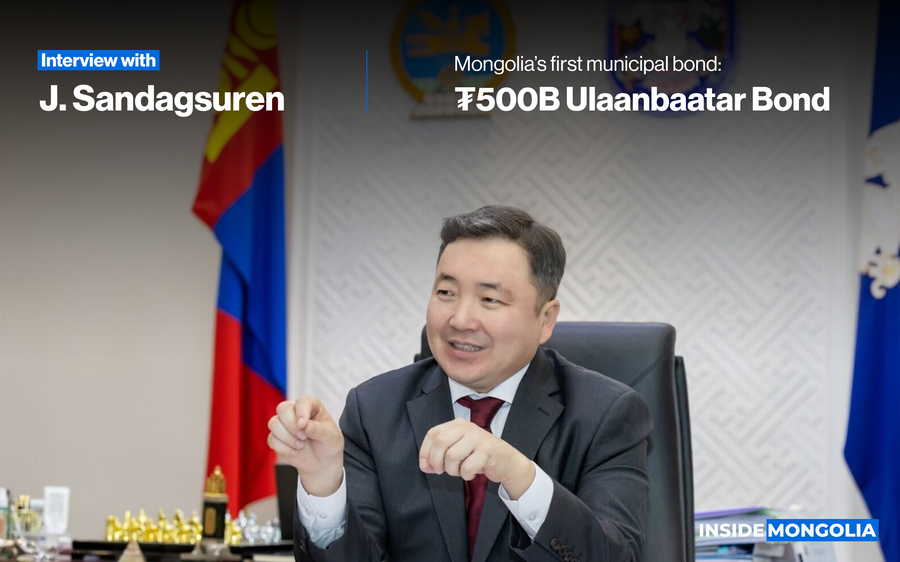Mongolia’s first municipal bond

Angirmaa
August 28, 2023
August 28, 2023

Ulaanbaatar City officials formally submitted its ₮500 billion bond introduction to the Financial Regulatory Commission (FRC). We had a conversation with J. Sandagsuren, the First Deputy Governor of Ulaanbaatar in charge of Economy and Infrastructure, regarding the bond.
While the idea of issuing municipal bonds has been discussed for years, this marks a historic moment as the first issuance of municipal bonds is now on the horizon. What led to this decision at this point?
J. Sandagsuren: The decision to proceed with municipal bond has not been hastily made. The Parliament firmly endorsed and approved the overhaul of the Law on the Legal Status of the Capital City, last year. Additionally, last month, both the Government and the Ministry of Finance allowed Ulaanbaatar City to issue municipal bond up to ₮500 billion. Subsequently, Citizens' Representative Khural (CRKh) of Ulaanbaatar city convened and decided to issue the bond. Therefore, this is a collective endeavor of the Parliament, Government, and CRKh.
Why now? Ulaanbaatar operates within a budgetary framework that inherently slows the pace of executing most projects due to budget constraints. Consequently, this situation results in increased costs and substantial missed opportunities. Against this backdrop, the city is embarking on the strategic endeavor to expedite the financing of urgent, high-impact societal projects, leveraging a novel financing mechanism aligned with international standards.
Could you elaborate on the scale, terms, and conditions underpinning the city's imminent municipal bond issuance?
J. Sandagsuren: BDSec (BDS) has been appointed as the underwriter. A plan is to raise ₮500 billion in 3 tranches. CRKh has set an upper limit of +5% above the policy rate on the interest rate. Naturally, our aim is to secure the lowest interest rate feasible. The projected tenure spans between 2 to 5 years, contingent upon the specific projects being financed.
What kind of projects are to be financed by the bond?
J. Sandagsuren: There are 4 general areas:
- Access to schools and kindergartens (₮100B): Historically, we used to allocate resources for school and kindergarten construction over a three-year period, incurring substantial losses of 30%-40%. Our revised approach aims to expedite construction for prompt utilization, leading to a markedly amplified societal impact.
- The first phase of the Selbe restoration project (₮150B): Recent flooding showed us the necessity of enhancing river infrastructure to avert such predicaments. Through enhancing riverfront infrastructure, Ulaanbaatar city aspires to develop alongside its river and make it more valuable.
- Air pollution (₮177.5B): Public health is the first priority. We need to take short-term actions till we transition to 100% cleaner energy sources and achieve a 100% sustainable housing landscape.
- Engineering infrastructure (₮72.5B): Mitigating traffic congestion entails enhancing minor access roads and pedestrian pathways.
Among these initiatives, public objections have been raised about allocating ₮177.5 billion to procure coking coal from China. Is it true?
J. Sandagsuren: The CRKh resolved to fund this project in its initial iteration. However, ongoing discussions are considering potential deferments or withdrawals. If adjustments are pursued, this project will be revisited and resolved by the CRKh. Should the project be omitted, funds will be redirected to support housing initiatives and the development of green housing for the city.
Turning to the matter of repayment, how will the city formulate its bond repayment strategy?
J. Sandagsuren: The city's budget revenue is increasing by 20%-30%. Tax revenues serve as a dependable and stable income stream. Departing from prior practices, which solely monitored budgetary performance, Ulaanbaatar embraced a novel framework in 2021, instituting a dedicated Debt Management Department. This transition facilitates comprehensive oversight of liabilities, loans, and assets, thereby nurturing heightened fiscal responsibility and management.
Also, we aim to increase the budget surplus in two ways. First, by fostering a favorable tax environment to magnify tax revenue. For instance, while a 1% NCC tax is levied, compliance with this has often been lax. Rectifying this will ensure comprehensive tax and fee collection, without necessitating a tax hike. Second, streamlining operations and reducing inefficiencies will curtail operational costs.
A key takeaway is that we will not allocate resources to non-existent expenses. Our objective is to expedite the release of innovations slated for a decade from now, effectively addressing challenges in an accelerated manner.
Thank you.
Comment